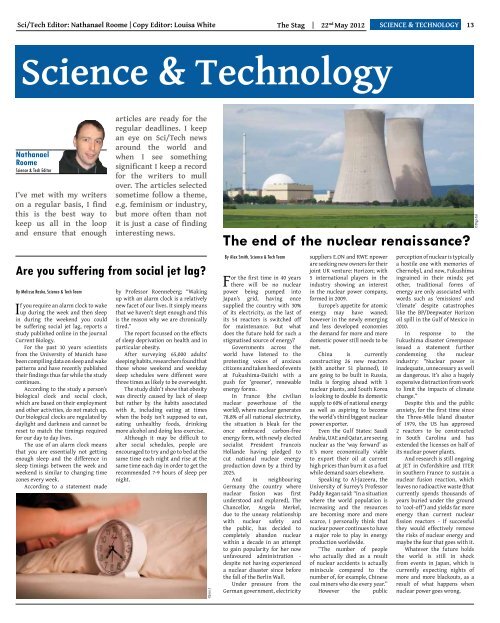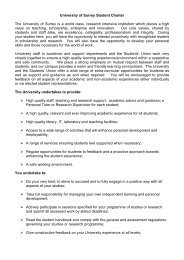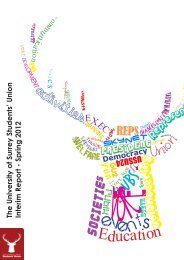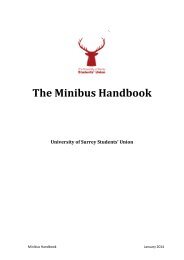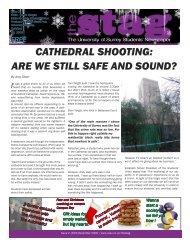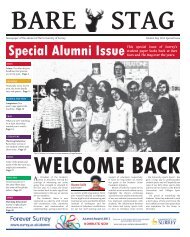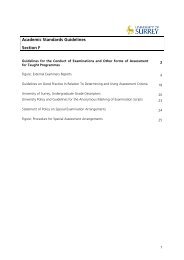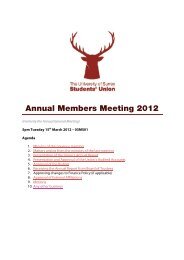AWARD NIGHTS SHOW OFF SURREY'S TALENT - University of ...
AWARD NIGHTS SHOW OFF SURREY'S TALENT - University of ...
AWARD NIGHTS SHOW OFF SURREY'S TALENT - University of ...
Create successful ePaper yourself
Turn your PDF publications into a flip-book with our unique Google optimized e-Paper software.
Sci/Tech Editor: Nathanael Roome | Copy Editor: Louisa White<br />
For the first time in 40 years<br />
there will be no nuclear<br />
power being pumped into<br />
Japan’s grid, having once<br />
supplied the country with 30%<br />
<strong>of</strong> its electricity, as the last <strong>of</strong><br />
its 54 reactors is switched <strong>of</strong>f<br />
for maintenance. But what<br />
does the future hold for such a<br />
stigmatised source <strong>of</strong> energy?<br />
Governments across the<br />
world have listened to the<br />
protesting voices <strong>of</strong> anxious<br />
citizens and taken heed <strong>of</strong> events<br />
at Fukushima-Daiichi with a<br />
push for ‘greener’, renewable<br />
energy forms.<br />
In France (the civilian<br />
nuclear powerhouse <strong>of</strong> the<br />
world), where nuclear generates<br />
78.8% <strong>of</strong> all national electricity,<br />
the situation is bleak for the<br />
once embraced carbon-free<br />
energy form, with newly elected<br />
socialist President Francois<br />
Hollande having pledged to<br />
cut national nuclear energy<br />
production down by a third by<br />
2025.<br />
And in neighbouring<br />
Germany (the country where<br />
nuclear fission was first<br />
understood and explored), The<br />
Chancellor, Angela Merkel,<br />
due to the uneasy relationship<br />
with nuclear safety and<br />
the public, has decided to<br />
completely abandon nuclear<br />
within a decade in an attempt<br />
to gain popularity for her now<br />
unfavoured administration -<br />
despite not having experienced<br />
a nuclear disaster since before<br />
the fall <strong>of</strong> the Berlin Wall.<br />
Under pressure from the<br />
German government, electricity<br />
The Stag | 22 nd May 2012<br />
Science & Technology<br />
Nathanael<br />
Roome<br />
Science & Tech Editor<br />
i’ve met with my writers<br />
on a regular basis, I find<br />
this is the best way to<br />
keep us all in the loop<br />
and ensure that enough<br />
articles are ready for the<br />
regular deadlines. i keep<br />
an eye on Sci/Tech news<br />
around the world and<br />
when i see something<br />
significant I keep a record<br />
for the writers to mull<br />
over. The articles selected<br />
sometime follow a theme,<br />
e.g. feminism or industry,<br />
but more <strong>of</strong>ten than not<br />
it is just a case <strong>of</strong> finding<br />
interesting news.<br />
Are you suffering from social jet lag?<br />
By Melissa Raske, Science & Tech Team<br />
If you require an alarm clock to wake<br />
up during the week and then sleep<br />
in during the weekend you could<br />
be suffering social jet lag, reports a<br />
study published online in the journal<br />
Current Biology.<br />
For the past 10 years scientists<br />
from the <strong>University</strong> <strong>of</strong> Munich have<br />
been compiling data on sleep and wake<br />
patterns and have recently published<br />
their findings thus far while the study<br />
continues.<br />
According to the study a person’s<br />
biological clock and social clock,<br />
which are based on their employment<br />
and other activities, do not match up.<br />
Our biological clocks are regulated by<br />
daylight and darkness and cannot be<br />
reset to match the timings required<br />
for our day to day lives.<br />
The use <strong>of</strong> an alarm clock means<br />
that you are essentially not getting<br />
enough sleep and the difference in<br />
sleep timings between the week and<br />
weekend is similar to changing time<br />
zones every week.<br />
According to a statement made<br />
by Pr<strong>of</strong>essor Roenneberg; “Waking<br />
up with an alarm clock is a relatively<br />
new facet <strong>of</strong> our lives. It simply means<br />
that we haven’t slept enough and this<br />
is the reason why we are chronically<br />
tired.”<br />
The report focussed on the effects<br />
<strong>of</strong> sleep deprivation on health and in<br />
particular obesity.<br />
After surveying 65,000 adults’<br />
sleeping habits, researchers found that<br />
those whose weekend and weekday<br />
sleep schedules were different were<br />
three times as likely to be overweight.<br />
The study didn’t show that obesity<br />
was directly caused by lack <strong>of</strong> sleep<br />
but rather by the habits associated<br />
with it, including eating at times<br />
when the body isn’t supposed to eat,<br />
eating unhealthy foods, drinking<br />
more alcohol and doing less exercise.<br />
Although it may be difficult to<br />
alter social schedules, people are<br />
encouraged to try and go to bed at the<br />
same time each night and rise at the<br />
same time each day in order to get the<br />
recommended 7-9 hours <strong>of</strong> sleep per<br />
night.<br />
©Jess J<br />
suppliers E.ON and RWE npower<br />
are seeking new owners for their<br />
joint UK venture: Horizon; with<br />
5 international players in the<br />
industry showing an interest<br />
in the nuclear power company,<br />
formed in 2009.<br />
Europe’s appetite for atomic<br />
energy may have waned;<br />
however in the newly emerging<br />
and less developed economies<br />
the demand for more and more<br />
domestic power still needs to be<br />
met.<br />
China is currently<br />
constructing 26 new reactors<br />
(with another 51 planned), 10<br />
are going to be built in Russia,<br />
India is forging ahead with 3<br />
nuclear plants, and South Korea<br />
is looking to double its domestic<br />
supply to 60% <strong>of</strong> national energy<br />
as well as aspiring to become<br />
the world’s third biggest nuclear<br />
power exporter.<br />
Even the Gulf States: Saudi<br />
Arabia, UAE and Qatar, are seeing<br />
nuclear as the ‘way forward’ as<br />
it’s more economically viable<br />
to export their oil at current<br />
high prices than burn it as a fuel<br />
while demand soars elsewhere.<br />
Speaking to Al-Jazeera, the<br />
<strong>University</strong> <strong>of</strong> Surrey’s Pr<strong>of</strong>essor<br />
Paddy Regan said: “In a situation<br />
where the world population is<br />
increasing and the resources<br />
are becoming more and more<br />
scarce, I personally think that<br />
nuclear power continues to have<br />
a major role to play in energy<br />
production worldwide.<br />
“The number <strong>of</strong> people<br />
who actually died as a result<br />
<strong>of</strong> nuclear accidents is actually<br />
miniscule compared to the<br />
number <strong>of</strong>, for example, Chinese<br />
coal miners who die every year.”<br />
However the public<br />
SCIENCE & TECHNOLOGY 13<br />
The end <strong>of</strong> the nuclear renaissance?<br />
By Alex Smith, Science & Tech Team<br />
perception <strong>of</strong> nuclear is typically<br />
a hostile one with memories <strong>of</strong><br />
Chernobyl, and now, Fukushima<br />
ingrained in their minds; yet<br />
other, traditional forms <strong>of</strong><br />
energy are only associated with<br />
words such as ‘emissions’ and<br />
‘climate’ despite catastrophes<br />
like the BP/Deepwater Horizon<br />
oil spill in the Gulf <strong>of</strong> Mexico in<br />
2010.<br />
In response to the<br />
Fukushima disaster Greenpeace<br />
issued a statement further<br />
condemning the nuclear<br />
industry: “Nuclear power is<br />
inadequate, unnecessary as well<br />
as dangerous. It’s also a hugely<br />
expensive distraction from work<br />
to limit the impacts <strong>of</strong> climate<br />
change.”<br />
Despite this and the public<br />
anxiety, for the first time since<br />
the Three-Mile Island disaster<br />
<strong>of</strong> 1979, the US has approved<br />
2 reactors to be constructed<br />
in South Carolina and has<br />
extended the licenses on half <strong>of</strong><br />
its nuclear power plants.<br />
And research is still ongoing<br />
at JET in Oxfordshire and ITER<br />
in southern France to sustain a<br />
nuclear fusion reaction, which<br />
leaves no radioactive waste (that<br />
currently spends thousands <strong>of</strong><br />
years buried under the ground<br />
to ‘cool-<strong>of</strong>f’) and yields far more<br />
energy than current nuclear<br />
fission reactors - If successful<br />
they would effectively remove<br />
the risks <strong>of</strong> nuclear energy and<br />
maybe the fear that goes with it.<br />
Whatever the future holds<br />
the world is still in shock<br />
from events in Japan, which is<br />
currently expecting nights <strong>of</strong><br />
more and more blackouts, as a<br />
result <strong>of</strong> what happens when<br />
nuclear power goes wrong.<br />
©Digi-tal


